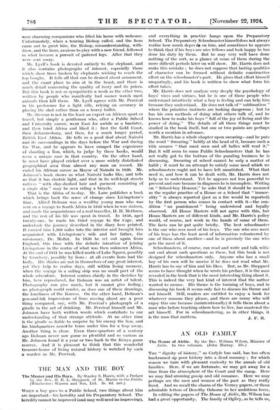AN OLD FAMILY
THE " dignity of history," as Carlyle has said, has too often buckramed up poor history into a dead mummy ; for which reason we turn with pleasant curiosity to the annals of old families. Here, if we are fortunate, we may get away for a time from the atmosphere of the Court and the camp. Here we may find amusing gossip and old romance. Here we may perhaps see the men and women of the past as they really lived. And we recall the charm of the Verney papers, or those admirable letters of Dorothy Osborne to her ambitious lover.
In editing the papers of The House of Airlie, Mr. Wilson has had a great opportunity. The family of Ogilvy, as he tells us,
" traces its stream backwards till it vanishes in the mists and shadows of a period anterior to recorded history," and in the period where records have been kept and mists are less frequent it has always played an honourable, and sometimes a distin- guished, part. It has given of its best and suffered without complaint for the causes in which it believed. There was even one Lord Airlie who not so long ago sacrificed a certain amount of popularity and prestige by becoming to his biographer's dismay, a Liberal. And his son and successor, the late Lord Airlie, who gave his life in the Boer War, was a man whose bravery and charm will not easily be forgotten. But Mr.
Wilson has been too much carried away by zeal for his subject. His own contributions are too long. He is apt to be too rhetorical. His apologies for what he considers defects are sometimes ill-advised. Take his description of the Sir Walter Ogilvy, who " laid the foundation," as he says, " of the family greatness " -
" Still in the flush of his early manhood with its radiant visions, its brilliant ideals, its innocent enthusiasms, he was full of enterprise, and had the virtuous gift of forethought. . . . Love's young dream did not blind his vision of materially aggrandizing his earthly portion . . . he was not consumed by weak sentiment to the detri- ment of an augmented fortune, and in this respect he set an example which many of his descendants have been shrewd enough to follow."
This is rather a long way of introducing us to the fact that in the year 1401 Sir Walter married an heiress, by which he added 6,000 acres to the family estate. It would be easy to pick out innumerable passages like this. The language is almost always overdone and sometimes wearisome. After we have heard, for instance, on one page that Lady Grizell Lyon was " now well stricken in spinsterhood," we do not want to be reminded on the next that " while she had parted with the bloom of her youth, she was still in the full enjoyment of virtuous womanhood." But it would be wrong to let these defects blind us to the merits of a very painstaking book to which its author has evidently devoted immense enthusiasm and industry. The Ogilvys as a race have been singularly handsome, and there are many excellent illustrations.



















































 Previous page
Previous page